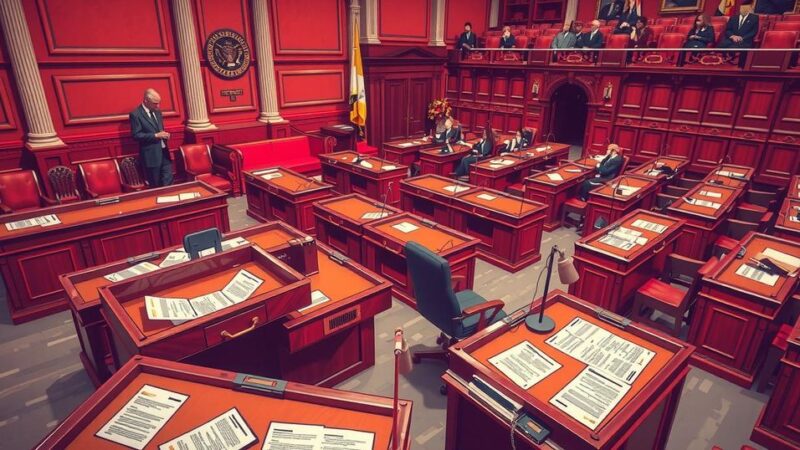Democratic senators, led by Tammy Duckworth, have expressed national security concerns over President Trump accepting a Boeing 747-8 jet from Qatar. They question the decision’s implications for safety and costs, while some GOP senators share similar worries. The White House dismisses these concerns as distractions from Trump’s achievements and insists the transaction is legal.
In a significant development, several Democratic senators have formally questioned Defense Secretary Pete Hegseth regarding President Trump’s recent decision to accept a luxury Boeing 747-8 jet from Qatar. They raised serious concerns about potential national security risks and counterintelligence issues tied to this transaction in a letter dated Wednesday. Leading the charge, Senator Tammy Duckworth (D-Ill.) emphasized, “The American people deserve to understand… the vulnerabilities its use will present to our national security.”
Earlier this week, President Trump described the aircraft handover as a “very public and transparent transaction.” However, criticism for this move has echoed among lawmakers, cutting across party lines. The Democratic senators branded the acceptance of the aircraft as “unconstitutional” and indicated that it might present vulnerabilities for Trump’s safety. They argued that the move “provides a dangerous opportunity to exploit for foreign intelligence agencies and adversaries seeking to do harm to the United States.”
Further concerns were voiced by Republican Senators Todd Young (Ind.) and Ted Cruz (Texas). Young declared that he was not comfortable with the acceptance of the jet, suggesting that potential listening devices and other security specifications warranted a deeper review of the matter. In the letter, a bipartisan group highlighted fears over national security, insisting that an unsanctioned Air Force One could carry notable risks.
The letter, which included signatures from key figures like Senators Jacky Rosen (Nev.), Elizabeth Warren (Mass.), and Chuck Schumer (N.Y.), addressed further issues like potential “waste, fraud and abuse.” The lawmakers mentioned President Trump’s aim to eliminate such inefficiencies and the unexpected financial implications of the aircraft. They pointed out that upgrading the Qatar jet to meet security standards could exceed $1 billion, questioning the rationale behind what Trump termed a “gift” valued at $400 million.
The senators remarked, “This administration has been vocal about its commitment to efficiency and cost-savings in the federal government,” asserting that spending taxpayer money on the jets’ upgrades was both unnecessary and a misuse of resources. An independent senator, Angus King of Maine, also attached his signature to the letter, which requests Hegseth to deliver responses regarding the jet by June 1.
Concern over ethical implications was also raised, particularly around Trump’s business ties in the region and connections held by other administration officials with Qatar. In defense of the President’s decision, a White House spokesperson rebuffed the criticisms, asserting that the letter was an attempt to divert attention from the administration’s achievements.
“President Trump… has repeatedly shown America’s best interests are his number one priority,” said White House spokesperson Taylor Rogers. On a related note, the uproar surrounding the Qatar jet coincides with the President’s ongoing trip to the Middle East, his second overseas visit since taking office, where he continues to emphasize substantial investments in the region.
While the controversy unfolds, The Hill has reached out to the Defense Department seeking comments on the matter. Concerns ranging from national security to ethical implications present a complicated backdrop to President Trump’s decision, illustrating the political divisions that continue to influence discussions on defense and foreign relations.
In summary, the controversy surrounding President Trump’s acceptance of a luxurious jet from Qatar has prompted significant scrutiny from both Democratic and Republican lawmakers. The bipartisan letter raises questions about national security, financial implications, and ethical concerns, urging for accountability in the wake of this transaction. As the debate unfolds, the administration continues to defend its actions in face of mounting criticism.
Original Source: www.yahoo.com






